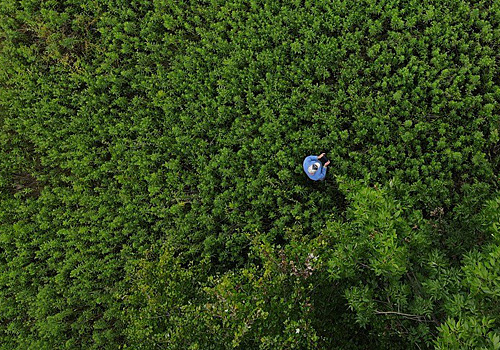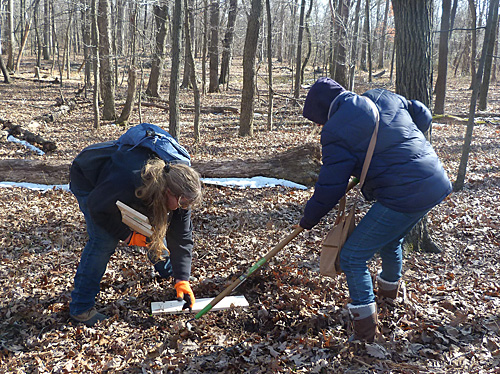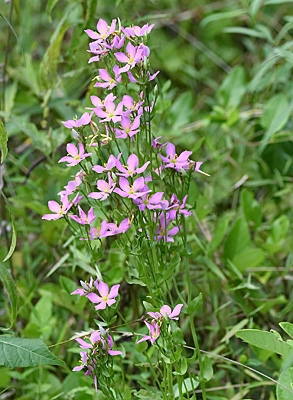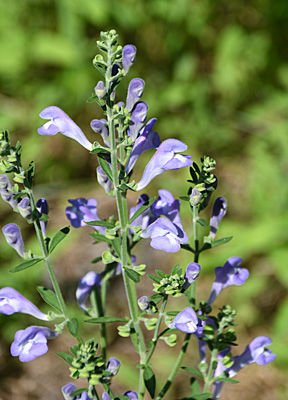Volume 27 Issue 2, Spring 2022
by Gerco Hoogeweg, JK Black Oak Committee Co-chair

Drone view of the western meadow full of goldenrods.
Photo by Michael Sciortino
This year will be action-packed for JK Black Oak Wildlife Sanctuary with advocacy, bird walks, nature walks, surveys, stream monitoring, and work days.High on the agenda remains our concern about a potential Route 15 western bypass of the Village of Lucketts. A western bypass would traverse JK Black Oak’s eastern wet meadow, home to many native plants and animals. We have spoken against this bypass option at public meetings, and we continue to host walks at the property for Planning Commission and Board of Supervisors members. We also have spearheaded public awareness and keep advocating for a different solution to resolve the traffic problems in Lucketts. A western bypass will not resolve this issue. At the latest Loudoun County Planning Commission work session on March 11, no recommendation for a bypass was voted on, though county planning staff recommends an eastern bypass.
Stream monitoring started last year at two locations at JK Black Oak. The results showed marginal to bad stream conditions. A defunct wastewater treatment plant was the primary culprit and resulted in very high E. coli levels in the stream. Loudoun Wildlife will conduct frequent water quality sampling and organize stream monitoring events in the spring and fall. The water quality sampling program is made possible thanks to a Google Data Centers Grants Fund grant administered by the Tides Foundation. We hope that our efforts will result in an improvement of local water quality.

Placing Salamander boards in the forest.
Photo by Sheila Ferguson
We continue to learn more about the Sanctuary during our nature surveys. From February to September, we are focusing on amphibians in and around our vernal pools. Vernal pools are critical breeding area for frogs and salamanders. This year, however, our vernal pools have been very dry, with only three of the pools containing water, and by early March the vernal pools were merely mud puddles.
Bird surveys will be conducted year-round, with the focus shifting to breeding bird surveys in late May through August, although we know that some bird species like hawks and owls start breeding earlier in the year. American Woodcocks, known for their spectacular display flights, are active from February to April. During this time, we will be on the lookout for evidence of breeding of this species. It would be awesome to confirm breeding woodcocks at the Sanctuary.
When bird activity slows down in the summer months, our focus will shift to butterfly and dragonfly surveys, as these insects are more active then. In August, JK Black Oak will be part of the Annual Butterfly Count, but we survey for butterflies and dragonflies during all our visits. We have learned that the highest butterfly densities are when the goldenrods are in bloom. You can learn more about which butterfly and dragonfly species we have found at the sanctuary on iNaturalist at our JK Black Oak Wildlife Sanctuary project site.

Rose-pink (Sabatia angularis) in the eastern wet meadow.
Photo by Gerco Hoogeweg
We are very excited that we will be teaming up with the Banshee Reeks chapter of the Virginia Master Naturalists (VMN) to survey for bats at the property. This effort is part of a larger project initiated by VMN volunteers to survey bat populations in Loudoun County. So far, we have confirmed the presence of at least two species, Silver-haired Bat and Hoary Bat, and may find others as we continue to analyze survey data.
A small team of people will be conducting native plant surveys in the spring and summer. The focus will be on meadow species. Information gathered during these surveys will be used to guide our plant rescue efforts prior to construction of the mitigation wetlands by The Nature Conservancy.
In December 2021, the JK Black Oak Committee met with The Nature Conservancy to review and discuss the draft wetlands mitigation design plan. The plan includes a 23-acre wetlands mitigation site where four new vernal pools and eight interconnected seasonal wetlands will be constructed and planted with native vegetation. At this time, we do not know when wetlands construction will begin, but likely not until early 2023. We are in the process of using our drone to capture aerial photographs of the site for before-and-after comparisons.

Hyssop Skullcap (Scutellaria integrifolia) in the eastern wet meadow.
Photo by Gerco Hoogeweg
Work days at JK Black Oak were very successful in 2021. We hosted eight public work days, including a trash pickup day with the Lucketts Ruritans and local community volunteers. In 2022 we are planning to host nine work days, which are scheduled on the first Saturday of the month from April to December. Most of these work days will be open to Loudoun Wildlife members, and one work day will be set aside as a day for the local community. During our work days we will focus on restoring and maintaining the western meadow, trash removal, plant rescue, trail maintenance, and vernal pool restoration. The latter will involve removing downed trees, creating brush piles, planting shrubs and trees, and removing invasive plant species such as Oriental Bittersweet, Autumn Olive, Japanese Stiltgrass, and worst of all, Wavyleaf Basketgrass.
Last but not least, there will be various walks taking place at JK Black Oak, including amphibian and bird walks, along with walks for donors and auction winners. An open house in the fall of 2022 is in the works. During this open house we plan on having representatives from various affiliated organizations and will provide information on future activities at the Sanctuary. We also plan to lead some walks during the day.
Please remember that to protect the environmentally sensitive habitat and rare species, JK Black Oak Wildlife Sanctuary is not open for general public access.

